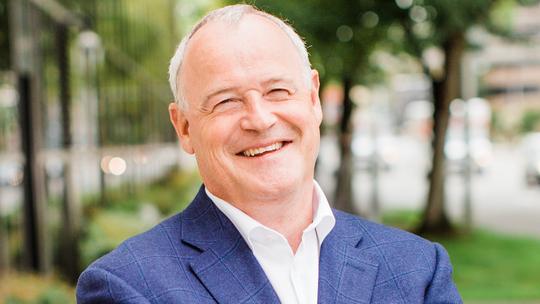Leen Kawas received a call from billionaire investor Richard Kayne within 30 minutes of losing her job in October 2021 as CEO of Athira Pharma Inc. (Nasdaq: ATHA).
Kayne was an early investor in Athira, the Bothell-based biotech focused on Alzheimer’s and Parkinson’s dementia Kawas had led as CEO since 2014. He wanted to meet with Kawas to talk about working together. Despite having a newborn baby and multiple offers to lead other biotechs as CEO, Kawas agreed to meet with Kayne in Los Angeles because working with him, according to Kawas, was an opportunity worth exploring.
They met in Kayne’s home office. Kawas soon realized Kayne wasn’t offering her a job but a chance to be a partner in a new biotech investing firm.
“It’s at that point I realized my professional status has changed,” Kawas says.
Five months later, Kawas and Kayne officially launched their new investing firm, Propel Bio Partners.
Kawas was the face of Athira before allegations of altered images in her doctoral work resurfaced in 2021 and ultimately forced her to resign. Athira, meanwhile, has dealt with backlash from Kawas’ supporters, class-action lawsuits from shareholders and even a proxy war from Kayne.
Fortunes that were once intertwined have diverged, and 15 months after she resigned, the future of Athira’s leading drug is in question.
‘Very motivated and very driven’
Kawas began with M3 Biotechnology, the predecessor to Athira, as vice president of research after earning her doctorate in molecular pharmacology from Washington State University in 2011.
She was going to take a job at the University of Pittsburgh before Joseph Harding, her thesis adviser, convinced her she was destined for something other than the traditional academia pipeline. Kawas considered working with M3 as something of a gap year before it ended up consuming a decade of her life.
Lewis Rumpler, the first CEO of M3, immediately pivoted the biotech to central nervous system diseases. But getting the company off the ground coming out of the Great Recession and raising money in Eastern Washington was overwhelming. Rumpler spent about two years trying to get investor interest with little success.
Rumpler was ready to let go when Kawas took over as CEO in 2014, and the young company relocated to Seattle.
“It was timely. There was no hope keeping the company in the Spokane region and my staying on as CEO,” Rumpler said. “(Kawas) was very motivated and very driven, and clearly wanted to move from the science lane to the business lane.”
Kawas says M3 almost folded two or three times in the early days, which isn’t uncommon for early-stage biotech companies.
Biotech startups can spend years raising money to fund research and development with the hopes of getting their experimental drugs through clinical trials. Many biotechs fail before reaching clinical trials, and even the successful ones will often wait a decade or more before their drug reaches the market.
For Kawas, M3’s mission was personal. Her grandmother had Alzheimer’s, and she knew a treatment for the disease could have a major impact on others who are suffering from the disease.
She remembers getting her first check in 2015 and depositing it at the Chase Bank near the University of Washington. It was the first of many.
The biotech raised a $10 million round in 2016 and followed that up with a $15.2 million round in 2017. In 2020, Athira raised $85 million in Series B funding. It all led to a $204 million initial public offering in September 2020.
Kawas’ success as a fundraiser and a CEO came not just from her understanding of Athira’s science but her ability to tell a compelling story. James Warjone, longtime chairman and CEO of the timber company Port Blakely Cos., first met Kawas at Suncadia Resort, a photogenic community near Roslyn on the Cle Elum River, tucked on the eastern slope of the Cascades.
Warjone was told by a colleague about a pitch Kawas was presenting at the resort. He hadn’t met Kawas and didn’t know about Athira but decided to sit in on the pitch. He was struck by Kawas’ humility, transparency and thoughtfulness. Plus, there was the potential impact of the drug.
“The federal government must be over the moon with this one because think of the liability that the federal government faces with Medicaid and Medicare,” Warjone says about his thinking at the time. “I said, ‘Leen, I want to help you and be part of what you’re doing.”
Denny Liggitt, a professor emeritus and longtime chair at the University of Washington’s department of comparative medicine, worked with M3 and Kawas shortly after the biotech moved to Seattle. Liggitt, who helped the company with toxicology and preclinical work, was struck by the startup’s commitment and seriousness.
“The problem with a lot of startup companies, they always think they know a lot more than they actually do. But Leen would listen,” Liggitt says. “I believe the company got to the point it was because of Leen.”
‘Casts doubt’
The news of Kawas’ split with Athira came abruptly in June 2021, when the company announced Kawas was being put on temporary leave pending a review of her doctoral work at WSU. Rumblings of altered images in her research had grown louder online through a niche group that flags these issues on PubPeer, a site that allows users to comment on academic articles.
Athira launched an independent review, which found Kawas had altered images in her doctoral dissertation and at least four papers she co-authored at WSU. In October 2021, Kawas had to resign.
There’s still disagreement over how relevant Kawas’ doctoral work is to Athira's current research. The Bothell-based biotech, which is now led by CEO Mark Litton, declined multiple interview requests from the Business Journal.

Elisabeth Bik spent about 15 years as a researcher at Stanford and two years in the private sector before becoming an independent consultant who monitors papers for dishonest data.
She reviewed Kawas’ doctoral research, and because the images had been manipulated and changed, she concluded that Athira made the right decision moving on.
“It casts doubt over all other data because we look at these photos and we see that these photos appear to have been altered. ... It removes my trust in the paper,” Bik says.
Nevertheless, fervent support for Kawas persists in the scientific community.
Harding, a faculty member at WSU since 1976, took to LinkedIn in April 2022 to defend Kawas. His post notes that Kawas certainly made a serious mistake in altering the images, but she admitted to the mistakes in 2015, and Harding and his lab notified the journal and reran the experiments, producing the same data. Moreover, Harding said Kawas’ “impeccable performance as Athira’s CEO” shouldn’t be overshadowed by an almost decade-old mistake.
Athira said Kawas’ research had nothing to do with the company’s lead drug, ATH-1017, but it’s not that simple, says Xue Hua, the former vice president of clinical development and research at Athira.
Hua, who led the company’s patient-centered research program for seven years starting in 2015, says Kawas’ questioned research is very tied to ATH-1017.
Hua left Athira in February 2022, when she felt it would have the least impact on Athira’s trials. She is now a managing partner in Kawas’ new investing firm, Propel Bio Partners.
“I knew I had to leave so I can speak about this because no one else is speaking about this,” Hua says. “I felt like it’s kind of a critical moment to address this, and there’s a really short window for this. If I don’t do this, I will regret it for the rest of my life.”
In a Medium post, Hua pointed out Kawas’ research was on Dihexa, which is the active drug of the pro-drug ATH-1017. The pro-drug is what goes into the body. The active drug is what the pro-drug becomes, and the active drug actually delivers positive results in the body.
Hua also alleged in her post the company made misleading scientific claims to the Securities and Exchange Commission. She pointed to a March 2022 filing with the SEC, in which Athira said “the conduct that was the subject of the allegations is not related to any of our current product candidates or ongoing clinical research,” a claim Hua says is wrong given the close ties between ATH-1017 and Dihexa.
Investors scrutinized Athira for its handling of the controversy, as well.
Warjone said Kawas made mistakes when staffing her board and giving control to people at Athira.
Kayne in March 2022 launched a proxy war to take two board seats and remove CEO Mark Litton, whom he called “an inexperienced, ineffective, failed executive.” He dropped his campaign in May because, as Kayne said in a letter to shareholders at the time, his election would be “very contentious and unproductive.”

‘Never say never’
Despite the turmoil of the past 19 months, Athira and those involved with the research believe the drug has promise.
The company released results from its phase 2 clinical trials in June 2022 that initially appeared disappointing, at which point the company’s stock price slid.
The trial found, however, that a subset of patients, namely those not on other forms of Alzheimer’s treatment, did see “a potentially beneficial change” to working memory processing speed and cognition compared with the placebo.
Athira now has an ongoing trial in which it is recruiting patients not taking an Alzheimer’s treatment called acetylcholinesterase inhibitors. The study will look at cognition and function.
Athira plans to finish enrollment by the middle of this year and report data in early 2024.
Multiple class-action lawsuits have been launched against the company since Kawas was first placed on leave. Many of the lawsuits have been consolidated, but they were ongoing as of a November regulatory filing.
In a written statement to the Business Journal, Litton, who took over after Kawas resigned, said: “At Athira, we remain focused on the advancement of compounds designed to restore neuronal health and slow neurodegeneration. Our priority is the efficient development of (Athira’s lead drug) fosgonimeton given the encouraging preclinical and clinical data to-date and the significant unmet need in mild-to-moderate Alzheimer’s.”
Liggitt says the company’s science still looks encouraging. It’s always a challenge in the biotech world to keep a company afloat long enough to develop effective treatments, he says, but given the vast unmet need for patients suffering from neurodegenerative diseases, any positive success from Athira’s drug could have a major impact.
More than 55 million people globally suffer from dementia, according to the World Health Organization.
Rumpler, the former CEO, points out that releasing clinical trials in June with any negative news would have been the hardest time in biotech over the past 20 years to release bad news, given the market conditions.
He called the past 19 months “an extensive bad news cycle” but believes the company still has opportunities.
Statistically, only a small number of biotechs will ever make it to the public markets like Athira. An even smaller number will develop life-saving treatments that will make it to doctors’ offices and patients’ medicine cabinets. Many will flame out before they become a known commodity in the Seattle area.
If Athira doesn’t run out of money, it could even pivot to other conditions like depression, peripheral neuropathy and amyotrophic lateral sclerosis (ALS), Rumpler says.
“The company has a number of swings at bat here,” Rumpler says. “I don’t think the story of Athira is in any way over.”
Even after her exit from the company, Kawas herself still believes in Athira’s science and is rooting for the company.
She equates her relationship with Athira to that of a parent who has sent their kid off to college. She even sent a note to employees encouraging them to keep working hard on Athira’s science.
Kawas, who now lives in Los Angeles, still feels connected with the company and its mission. When asked if she would ever lead a biotech again, she paused.
“Never say never,” she said.








